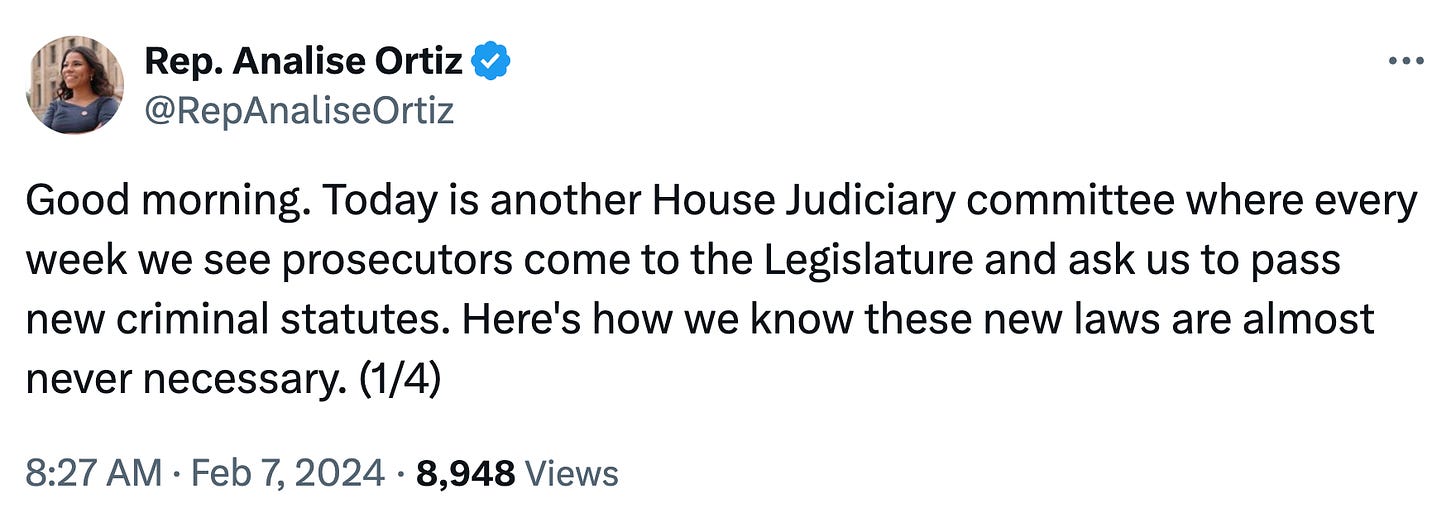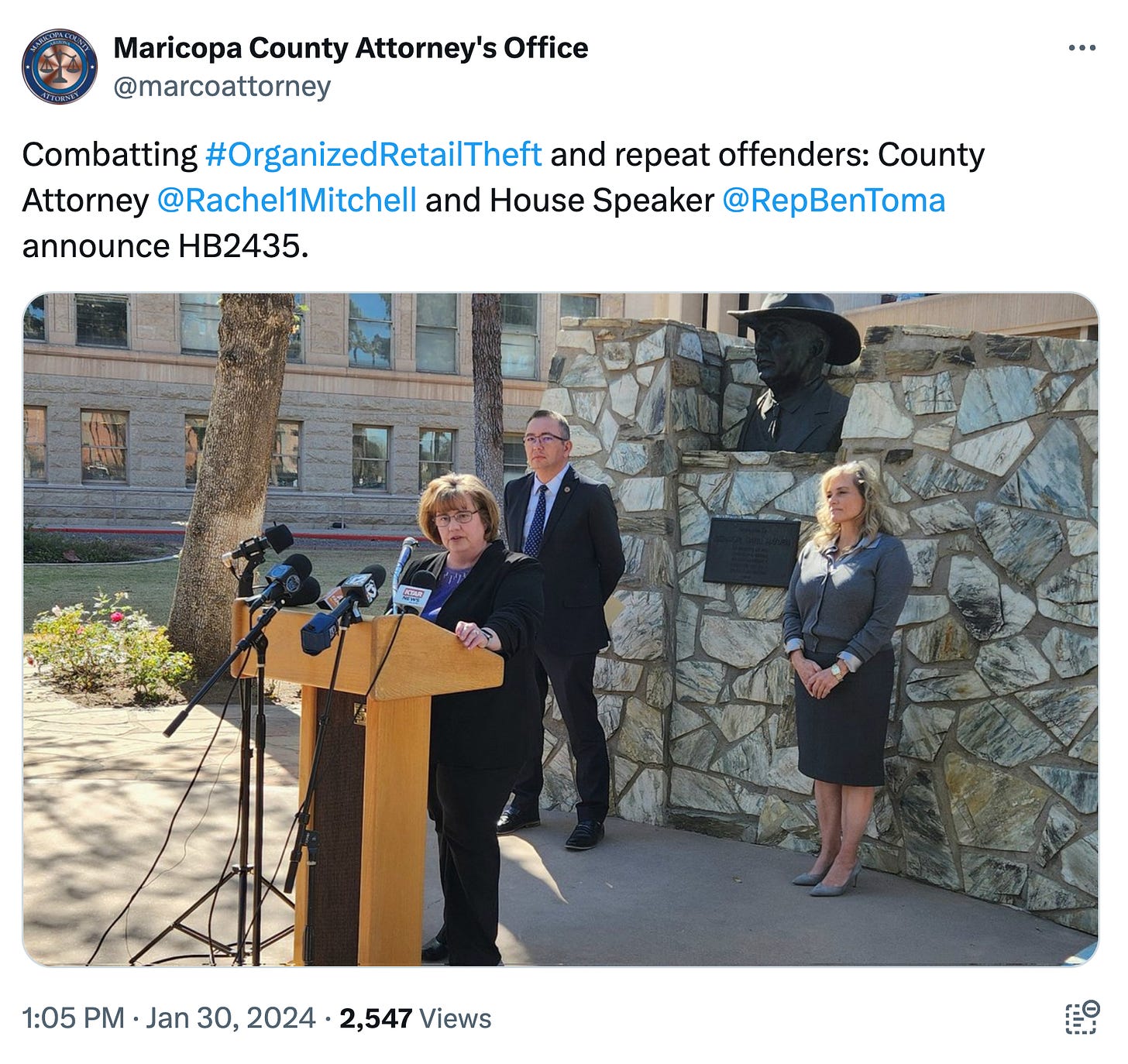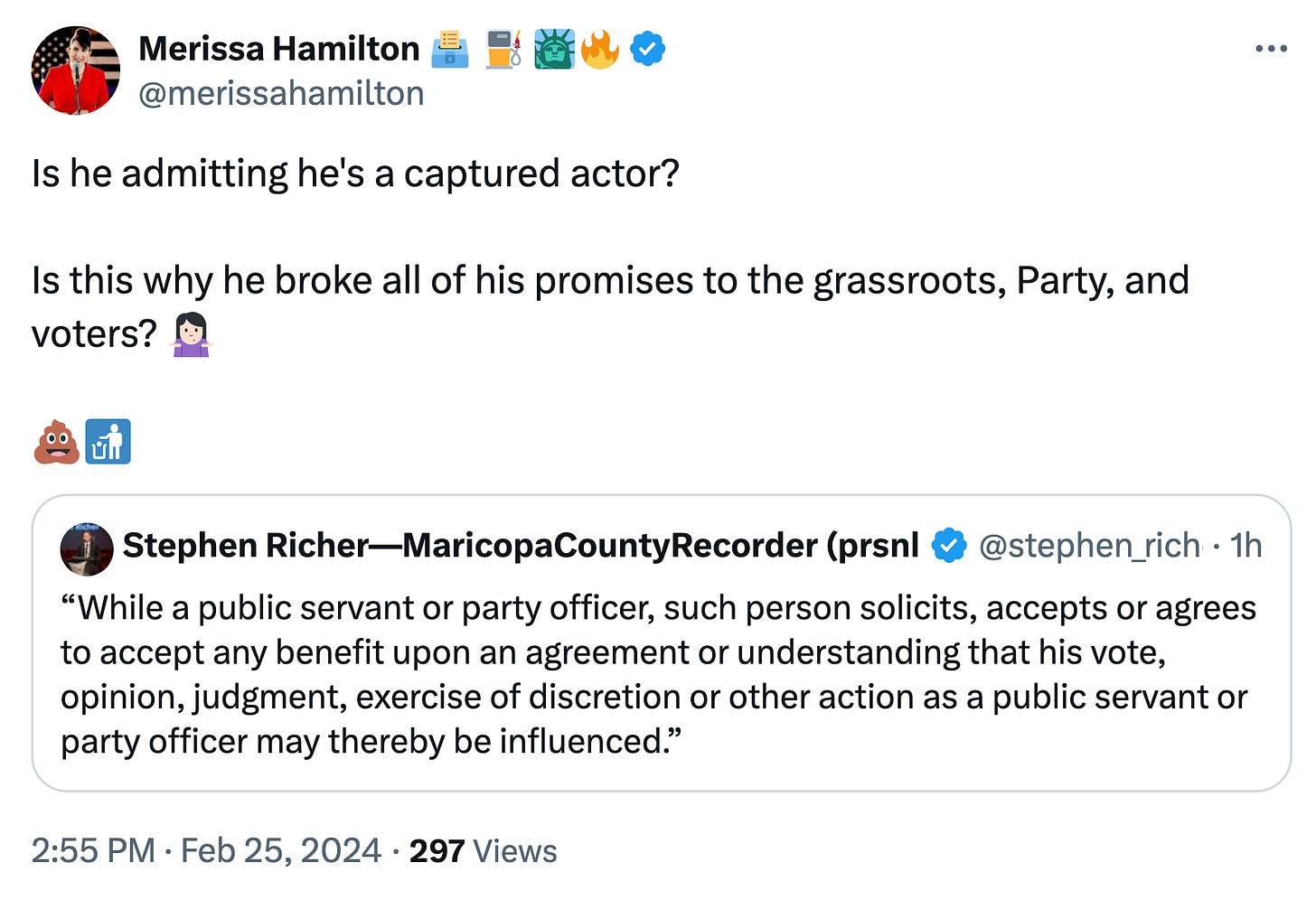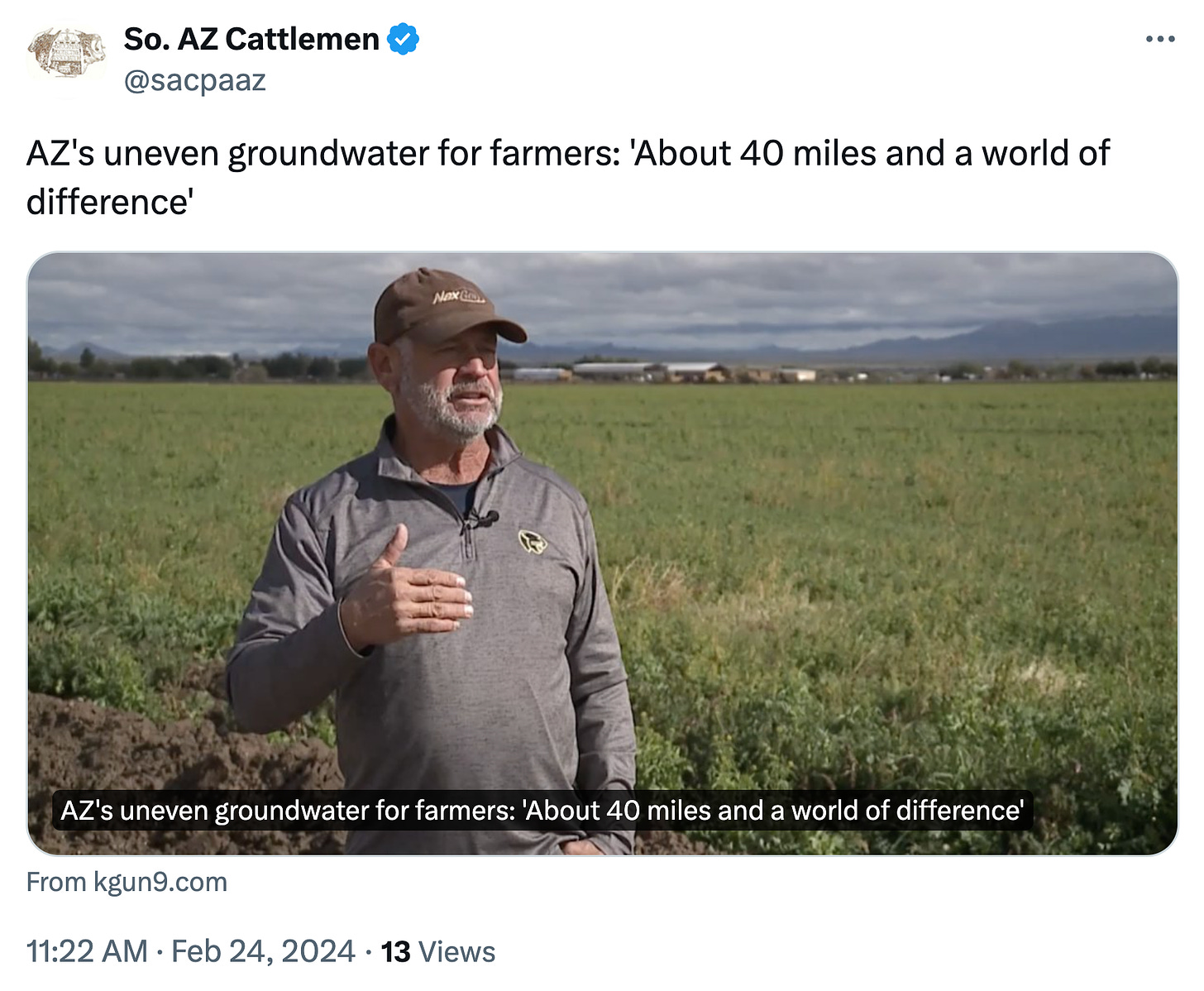The Power of the Prosecutors
The political spectrum is a circle ... Stephen Richer gets a challenger ... And just another jackass politician.
Prosecutors have always found a friendly audience when pushing the Republican-controlled Legislature to create harsher criminal penalties.
Perhaps too friendly, if you ask Republican Rep. Alex Kolodin, an attorney whose thinking represents a break from traditional tough-on-crime conservatism to a more modern MAGA skepticism of prosecutorial power.
“As a sort of MAGA guy, this is what I'm sensitive to, is that now you've handed so many laws to prosecutors that if they want to target MAGA Republicans, they can come after you for something that the black letter of the law allows, potentially, but something that was never contemplated by the Legislature as a way that law would actually be used,” he said.
Kolodin’s willingness to buck his party’s deference to prosecutors hasn’t always made him beloved by his Republican colleagues on the House Judiciary Committee, which deals with bills that would stiffen penalties for crimes, or really any changes to Arizona criminal code.
He voted “present” on a lot of bills this year, causing consternation from the committee chairman and a reshuffling of committee members after the year’s first meeting to ensure it has a two-seat Republican majority and Kolodin can’t unilaterally vote down Republican bills.

As the only practicing attorney on the committee, Kolodin is wary of unintended consequences, and he brings that up a lot during committee conversations, when explaining his votes and when offering amendments.
For example, when the House Judiciary Committee heard Rep. Selina Bliss’ HB2044, which would require anyone who killed someone while driving drunk to pay restitution to the victim’s child, Kolodin asked how the bill would work with the doctrine against double recovery, which means someone can’t claim for the same loss twice, given statutes already exist to provide restitution to victims. The question stumped a lobbyist with the Association of Counties, which lobbies on behalf of prosecutors.
Kolodin and the Arizona Attorneys for Criminal Justice — a coalition of public and private criminal defense attorneys and the state’s only organization that lobbies for the legal defense community — often comprise the only pushback that the prosecutors face at the Capitol. Public defenders can’t lobby at the state Legislature on behalf of their offices, per state law. That law doesn’t apply to departments “Headed by one or more elected officials,” including county attorneys, allowing them to use taxpayer dollars to lobby for bills they want passed.
“We're really committed to this because we're willing to use our PTO to try to help change things at the state Legislature,” said Katie Gipson-McLean, a co-chair of the legislative committee for the criminal defense lobbying group. “I think that's a huge deficiency because there's so much getting thrown at the legislators from the prosecution side, and if a (we weren’t) there, there'd be a huge hole.”
The Arizona Association of Counties lobbies for or against bills based on a majority opinion of Arizona’s 15 county attorneys — a group of elected who often win by running “tough on crime” campaigns.
Maricopa County often brings in its lobbyist to convince lawmakers to stiffen criminal penalties, as does the attorney general. Pinal County Attorney Kent Volkmer has shown up to support several penalty-increasing bills this year.
Given the massive lobbying presence alone, those charged with enforcing Arizona’s laws have a lot of say in how they’re crafted.
Not a single bill that prosecutors opposed in Arizona became law in the last four years, according to a study conducted by the Washington and Lee Law Review that analyzed four years of legislative activity from all fifty states. The study ranks Arizona as the fifth most successful state for prosecutors to pass criminal justice bills, and says prosecutorial success correlates with Republican control of the state Legislature.
It’s not that Kolodin’s soft on crime, he’s just distrustful of the centralization of power in prosecutorial agencies. Perhaps his colleagues have been too soft on prosecutors when it comes to questioning their collective push to constantly increase criminal penalties.
“Even though each bill on its face may be superficially reasonable … The cumulative effect is that we essentially hand infinite discretion to prosecutors, which, I think is too much power for any anybody to possess,” he told us. “And they get to decide who goes to jail and for how long, and that's especially aggravated by the fact that so many of the statutes are so vague.”
Unlock your leadership potential and achieve optimal well-being with transformative workshops and personalized health coaching. Certified in Dare to Lead TM by Dr. Brené Brown. Workshops begin in March.
Keeping us guessing: MAGA forces are promising to unveil their anointed candidate to run in a GOP primary against Maricopa County Recorder Stephen Richer during a press conference at the Capitol on Wednesday. While the anti-Richer crusaders are keeping a tight lid on who the candidate is, the rumor mill suspects it’s Republican Rep. Justin Heap, as Richer’s subtweet of Heap would suggest.
Keeping us waiting: A citizens’ panel in the West Valley’s Legislative District 22 picked new names to replace Democratic Rep. Leezah Sun after Democratic activists in the district took too long to make their choices. They picked two of the three same people as the activists did — Tolleson Union High School Governing Board member Elda Luna-Najera and former state Sen. Martin Quezada — but swapped out Natacha Chavez, whom activists chose as a potential replacement, for Steven Chapman, who ran for the district in 2022, per the Capitol Times’ Jakob Thorington. The Maricopa County Board of Supervisors will make the final choice from the three names.
Former enables scramble: Former Arizona flack turned Trump White House spokeswoman Stephanie Grisham and other Republicans who saw the light on Trump pre and post-January 6 are considering moving to non-extradition countries in case the famously retaliatory former president returns to office, NBC news reports. Grisham said the extradition thing is mostly a joke, but she is squirreling away cash in case of an emergency. Her mom thinks it’s no big deal.
“I’m like, ‘OK, Mom. You don’t know him,’” Grisham told NBC.
Free the records, part 1: The right-wing news outlet Washington Free Beacon wants court documents of U.S. Senate candidate and Congressman Ruben Gallego’s divorce with Phoenix Mayor Kate Gallego and is asking the court to unseal the records, the Republic’s Ron Hansen reports. While the two remain close, the breakup has long been the source of political intrigue. The Gallegos are not happy, implying Kari Lake is behind the organization’s sleazy attempt at a smear campaign.
“This disgusting political stunt does nothing but endanger (the Gallegos’ 7-year-old son’s) safety and put him at risk. It is shameful that anyone would stoop this low, but I’m not surprised to see this from Kari,” Ruben Gallego said in a statement.
Free the records, part 2: Attorney General Kris Mayes wants the entire transcript of the Cochise County supervisors’ grand jury made public after Supervisors Peggy Judd and Tom Crosby filed a legal appeal that cited the documents heavily, Votebeat’s Jen Fifield writes. Those documents have since been sealed, as grand jury testimony is usually not public information.
(Practically) free water!: The state auditor general blasted the land department in a new report for its sweetheart deal with Saudi farming giant Fondomonte, saying it was paying below-market rates and with zero oversight or regulation, Capitol scribe Howie Fischer reports. Meanwhile, Mayes was down in Cochise County on Friday listening to residents' concerns about rapid groundwater depletion. She threatened to take groundwater regulation to the ballot if lawmakers don’t do anything to address it this year, KGUN’s Madison Thomas reports.
Sovereignty has its downsides: Native American tribal governments aren’t allowed to prosecute non-natives for most crimes, including drug trafficking, which is an especially big problem in the fentanyl era, NPR reports. Congress has allowed tribes to prosecute non-tribal members for certain crimes, like domestic violence, and tribes want to extend that permission to drug trafficking as well.
Back by popular demand: Hank joined AZFamily’s Dennis Welch on the “Politics Unplugged Podcast” this week. The two trash-talked Arizona’s politicians and caught up on the gossip of the legislative session.
The City Council of Oatman, Arizona, thinks the mayor is a jackass politician.
But really, Mayor Walter is a jackass — he’s a donkey that the city council elected as mayor.
Oatman is an old mining town that’s now mostly known for its wild burros, 12News’ John Bartell explains, and since the town is mostly kept afloat by wild donkey tourism, and donkeys outnumber people there, it’s only fitting Walter the donkey was officially named mayor.












Pretty sure that's Anne Archer in the pantsuit.